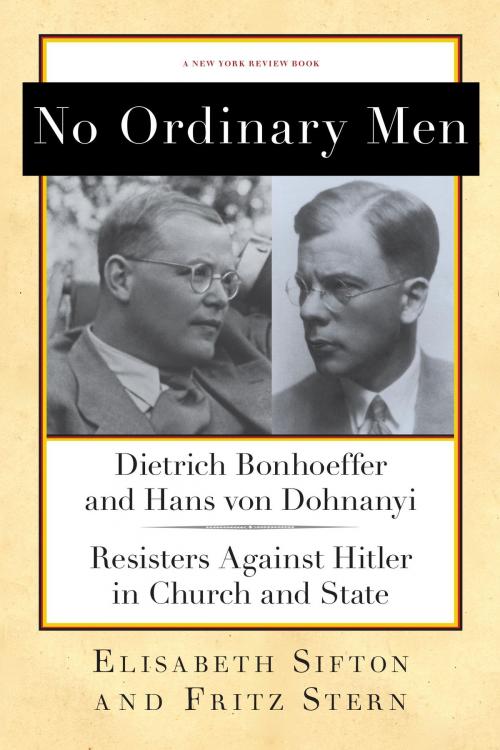No Ordinary Men
Dietrich Bonhoeffer and Hans von Dohnanyi, Resisters Against Hitler in Church and State
Nonfiction, History, Germany, Biography & Memoir, Religious, Military, World War II| Author: | Fritz Stern, Elisabeth Sifton | ISBN: | 9781590177020 |
| Publisher: | New York Review Books | Publication: | September 17, 2013 |
| Imprint: | New York Review Books | Language: | English |
| Author: | Fritz Stern, Elisabeth Sifton |
| ISBN: | 9781590177020 |
| Publisher: | New York Review Books |
| Publication: | September 17, 2013 |
| Imprint: | New York Review Books |
| Language: | English |
During the twelve years of Hitler’s Third Reich, very few Germans took the risk of actively opposing his tyranny and terror, and fewer still did so to protect the sanctity of law and faith. In No Ordinary Men, Elisabeth Sifton and Fritz Stern focus on two remarkable, courageous men who did—the pastor and theologian Dietrich Bonhoeffer and his close friend and brother-in-law Hans von Dohnanyi—and offer new insights into the fearsome difficulties that resistance entailed. (Not forgotten is Christine Bonhoeffer Dohnanyi, Hans’s wife and Dietrich’s sister, who was indispensable to them both.)
From the start Bonhoeffer opposed the Nazi efforts to bend Germany’s Protestant churches to Hitler’s will, while Dohnanyi, a lawyer in the Justice Ministry and then in the Wehrmacht’s counterintelligence section, helped victims, kept records of Nazi crimes to be used as evidence once the regime fell, and was an important figure in the various conspiracies to assassinate Hitler. The strength of their shared commitment to these undertakings—and to the people they were helping—endured even after their arrest in April 1943 and until, after great suffering, they were executed on Hitler’s express orders in April 1945, just weeks before the Third Reich collapsed.
Bonhoeffer’s posthumously published Letters and Papers from Prison and other writings found a wide international audience, but Dohnanyi’s work is scarcely known, though it was crucial to the resistance and he was the one who drew Bonhoeffer into the anti-Hitler plots. Sifton and Stern offer dramatic new details and interpretations in their account of the extraordinary efforts in which the two jointly engaged. No Ordinary Men honors both Bonhoeffer’s human decency and his theological legacy, as well as Dohnanyi’s preservation of the highest standard of civic virtue in an utterly corrupted state.
During the twelve years of Hitler’s Third Reich, very few Germans took the risk of actively opposing his tyranny and terror, and fewer still did so to protect the sanctity of law and faith. In No Ordinary Men, Elisabeth Sifton and Fritz Stern focus on two remarkable, courageous men who did—the pastor and theologian Dietrich Bonhoeffer and his close friend and brother-in-law Hans von Dohnanyi—and offer new insights into the fearsome difficulties that resistance entailed. (Not forgotten is Christine Bonhoeffer Dohnanyi, Hans’s wife and Dietrich’s sister, who was indispensable to them both.)
From the start Bonhoeffer opposed the Nazi efforts to bend Germany’s Protestant churches to Hitler’s will, while Dohnanyi, a lawyer in the Justice Ministry and then in the Wehrmacht’s counterintelligence section, helped victims, kept records of Nazi crimes to be used as evidence once the regime fell, and was an important figure in the various conspiracies to assassinate Hitler. The strength of their shared commitment to these undertakings—and to the people they were helping—endured even after their arrest in April 1943 and until, after great suffering, they were executed on Hitler’s express orders in April 1945, just weeks before the Third Reich collapsed.
Bonhoeffer’s posthumously published Letters and Papers from Prison and other writings found a wide international audience, but Dohnanyi’s work is scarcely known, though it was crucial to the resistance and he was the one who drew Bonhoeffer into the anti-Hitler plots. Sifton and Stern offer dramatic new details and interpretations in their account of the extraordinary efforts in which the two jointly engaged. No Ordinary Men honors both Bonhoeffer’s human decency and his theological legacy, as well as Dohnanyi’s preservation of the highest standard of civic virtue in an utterly corrupted state.















